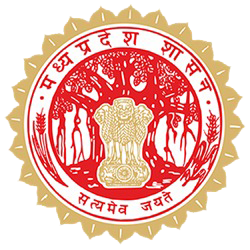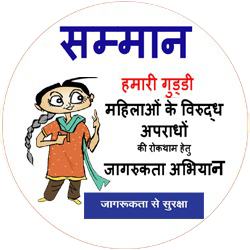DGP MP Lecture Series Organized Program with CEO of Indian Cyber Crime Coordination Center (I4C), Ministry of Home Affairs
Bhopal, May 16, 2024 In Madhya Pradesh, continuous actions are being taken by the state cyber police against cyber criminals to control cyber crimes, and awareness is being spread through various innovations. In this sequence, on Thursday, May 16, a workshop for police capacity development was organized in the conference hall of the police headquarters. DGP Mr. Sudhir Saxena remained present throughout the workshop. As a special speaker, Mr. Rajesh Kumar, CEO of the Indian Cyber Crime Coordination Center (I4C), Ministry of Home Affairs, provided training to police officers on the prevention of cyber crimes and providing immediate assistance to victims. The workshop was attended by 700 officers of the rank of DSP and above. DSPs, ASPs, SPs, DIGs, and IGs from the field joined online, and all officers up to the level of ADG, IG, DIG, AIG, and DSP stationed at the headquarters were also present in the conference hall.
All 100% of calls coming to 1930 are being answered: At the beginning of the training, CEO Mr. Rajesh Kumar congratulated the MP Police, stating that Madhya Pradesh is the first state where police officers across the state are receiving training on a large scale in a hybrid mode. He mentioned that the rate of increase in cyber crimes is very high. Cyber crimes occurring in India are mainly operated from Eastern, Southern states, and areas around Delhi, as well as from South Asian countries outside India. People of Indian origin are also involved in these crimes. He expressed satisfaction with the efforts being made by the Madhya Pradesh Police in the prevention of cyber crimes and mentioned that the Indian Cyber Crime Coordination Center of the Government of India is exploring new solutions for controlling cyber crimes, which can assist in the investigation. Coordination and combined efforts of various states are necessary for the prevention of crimes, for which the Cyber Crime Coordination Center is especially active.
Mr. Rajesh Kumar, CEO of the Indian Cyber Crime Coordination Center (I4C), mentioned that over 7,000 complaints related to cyber crimes are received daily across the country. He stated that cyber crimes increased by 113.7% from 2021 to 2022, and by 60.9% from 2022 to 2023. He said that public cooperation is also essential for controlling cyber crimes, and people can register themselves as public volunteers by visiting www.cybercrime.gov.in. Police personnel can work by visiting www.cyberpolice.nic.in. On this occasion, he provided detailed information about various initiatives such as the anti-cybercrime portal, coordination platform, JMIS, 1930, etc. He stated that 100% of calls coming to 1930 are being answered, reflecting the promptness of the police. He mentioned that in cases of cyber fraud, quick notification by the complainant and prompt action by the police can lead to swift resolution.
Addressing challenges is necessary: DGP DGP Mr. Sudhir Kumar Saxena discussed the challenges faced by the police in controlling cyber crimes. He mentioned that the police face multiple challenges in the cyber field. These challenges include criminals adopting new methods, a high number of cyber crimes, geographical issues such as the perpetrator committing a crime in one district and fleeing to another, lack of resources for controlling cyber crimes, and the need for special training and experts at the district level. Additionally, the biggest challenge is knowing how to provide prompt assistance to victims. Addressing these challenges is necessary. He said that victims’ lack of knowledge is also a significant issue; even many police personnel are not fully aware of what needs to be done to control cyber crimes. Therefore, it is essential that all officers remain on the same platform and understand what needs to be done actively. He mentioned that such training should be extended to all levels by the SPs of each district so that common people affected by cyber crimes can feel relieved.
DGP instructed the appointment of nodal officers in each district for controlling cyber crimes. DGP Mr. Sudhir Saxena stated that the benefit of the special training received in the said program should reach the police personnel at the last level. For this, all SPs have been instructed to ensure that such training is conducted at the district level so that more and more people can benefit from it. He mentioned that special efforts should be made by police officers to ensure that victims of cyber crimes receive immediate assistance and that the defrauded amount is recovered for them.
Providing quick assistance to cyber crime victims: A team from Delhi provided special solutions to police officers for various cyber crimes, such as money disappearing from victims’ bank accounts, fraud, and blackmailing of women. They explained how the phone numbers of fraudsters can be quickly blocked and how the defrauded amount can be recovered and returned to the victims with the help of the Cyber Crime Coordination Center and banks. DGP Mr. Saxena instructed all police officers that providing immediate assistance to victims should be their priority and that they must be proficient in cyber investigations.
Discussion with SPs and other police personnel from districts, problem-solving: In the final session of the workshop, SPs from different districts discussed the problems faced during the control of cyber crimes. Special speaker Mr. Rajesh Kumar addressed the queries and issues raised by the SPs. Additionally, several police officers provided suggestions for improving the system to better control cyber crimes. Challenges faced during the investigation of complex cyber crimes were also discussed. The program received high praise from all attending officers





